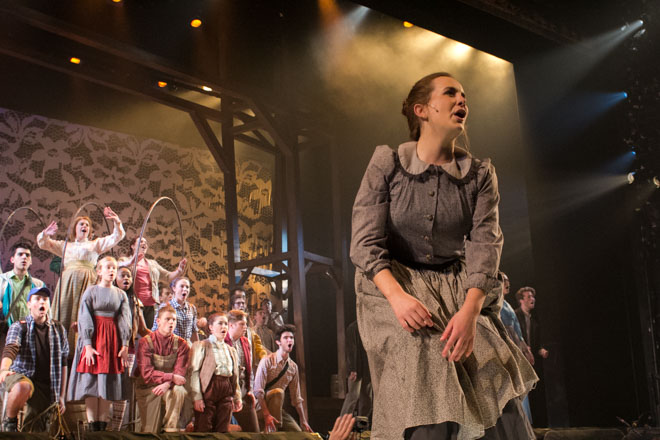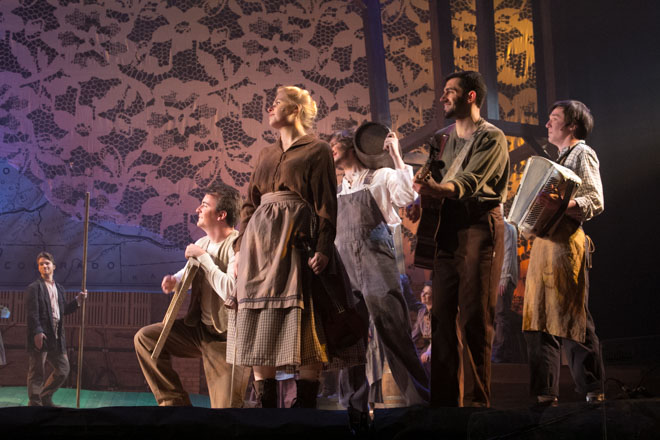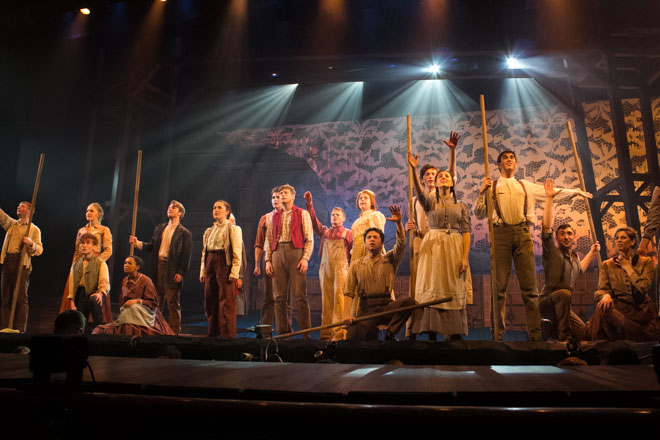
President West 2020? We kind of hope not. Luckily Waa-Mu has us covered with an aptly titled 85th annual show: Another Way West. The show is completely written, performed and presented by Northwestern students (and disclaimer: it’s not about Kanye West at all, but the Oregon Trail).
Putting together each show takes about a year, starting right after the previous show ends. NBN caught up with some of the writing and performing geniuses behind the scenes, who told us about the history of Waa-Mu, this year’s show and their favorite parts of being a part of the production. Their interviews have been edited for length and clarity.
The show will take place Friday, April 29 and Saturday, April 30 at 7:30 p.m., Sunday, May 1 at 2 p.m., Thursday, May 5 and Friday, May 6 at 7:30 p.m., Saturday, May 7 at 2 p.m. and 7:30 p.m., and Sunday, May 8 at 2 p.m. All shows are at Cahn Auditorium.
Christopher Anselmo, Waa-Mu Associate Director
In your own words, what is Waa-Mu?
The main part to it is that it began as an annual review to showcase student-written work, theatrical work. The other part of it, now what has been developing, is a year-long program for young musical theater writers to give them an opportunity to write a full-length musical, something that most young writers do not get the opportunity to do until way after graduation.
This is the 85th year [of Waa-Mu]. It began in 1928. The Women’s Athletic Association and the Men’s Union came together to do a fundraiser and during that time reviews on Broadway were very popular, so they decided to write their own songs and put that on stage and make some money off of it. And then it kind of developed into the Waa-Mu show, into this large, large thing.
And how did you get involved in Waa-Mu?
I actually decided to come to Northwestern because of Waa-Mu. I’ve been very interested in playwriting and writing for musical theater for a very long time and Northwestern’s the only university that has a program like this, that gives students the opportunity to do something this big.
So, what is this year’s show about?
So this year’s show is called Another Way West and it follows two story lines. The main story line is Kate, who is a graduate student, and she’s basically recreating the original trip of the Oregon Trail. Her main reason for doing so is to follow this journal that she’s had her entire childhood that’s her family’s journal that her ancestor, Kathleen, wrote in. So the story follows Kate as she goes on this trip to sort of discover her family roots, and we get to see the other side of the story, which is Kathleen’s story, and she’s taking that trip in 1852. She’s Irish, her and her family leave Ireland because of the famine – they have no food, no work. They come to America and they find a similar situation in New York, so they decide to head out west.
How are the topics decided?
At the end of every year, the people on the creative team submit ideas to David Bell, the professor that’s in charge of the program, and then he meets with the co-chairs, and the head writers and the creative team, and all together we decide which topic we feel has the most material, the story that we’re most interested in at the time.
And what do you do with Waa-Mu now?
So there’s creative team in the fall. In the winter, there’s a head writing team – there’s a class on Wednesdays, and then on Fridays we have a smaller class which is all the section heads.
And currently, now that we are in rehearsals, I’m the associate director, which means I’m assisting David Bell, the director of the production, and if he needs me to talk to actors or communicate with writers or with designers, I’m kind of the go-between.
So you guys have been working on this all year. When did the actors come in?
So, part of my duties as the associate director is that David and I were in charge of casting the show. What’s interesting, though, is that it’s not written when it’s cast. People come to audition and a lot of it is, “Oh, this actor’s fantastic, and we think they bring a lot to the story, let’s write a character for them.” So a lot of it is actually based off of that. So actors were cast the second week of Winter Quarter. Then we didn’t start rehearsals until the first day back for Spring Quarter.
Coolest perk of the job?
You get to put on the largest student written musical in the country and maybe even the world. There’s a 1,500 seat theater, there’s a huge alumni base of people who are dedicated to the Waa Mu show who have done it in the past 85 years, and they come to see the show and you get to talk to them about the year they did it. It’s just an incredible experience to have that connection to past Northwestern students.
If you were to re-name the Waa-Mu acronym to mean something else, what would it mean?
The Wonderful Association of Actors, Musicians and Upstanding People (one word).
So since the show is titled Another Way West, which West is more important to American culture: Kanye West or westward expansion?
That’s difficult, because the westward expansion did come with a lot of really devastating erasing’s of culture, but also Kanye West is not the most upstanding citizen in the country at the moment. It’s a tough question – it sounds like a lose-lose situation to me.
Where would your journal lead your descendants?
Cahn Auditorium.

Jon Bauerfeld, Waa-Mu Head Writer
In your own words, what is Waa-Mu?
A massive collaboration…that results in an amazing product.
When did you get involved?
I got involved in the 2014 show. I was involved only in the Spring Quarter; I was orchestrating. Then, I was a head writer for last year’s show and the head writer this year.
What’s special about this year’s production in particular?
For the past couple of years, Waa-Mu has been growing as an organization in terms of what it’s been tackling. For a very long time, it was in the review format, which is just songs and a general theme. David Bell came in a couple of years ago and decided he wanted it to be an original book musical. From there, we’ve tried to tackle more and more difficult thing. This year, it is our own story, our own characters and that’s new. It’s a completely original story. The only source material we have is the fact that the Oregon Trail happened. I think it shows in the story. The story has a lot of heart.
What’s the biggest takeaway from your involvement in the show?
It’s taught me how to work with people in a really intense way. When you have 50 people, 60 people, in the winter trying to write the same show, it requires a lot of communication. Especially as a head writer, that’s one of my jobs, to keep everyone on the same page.
